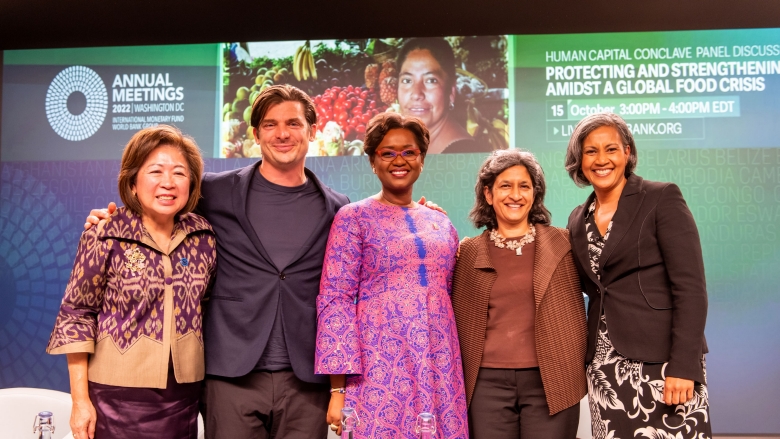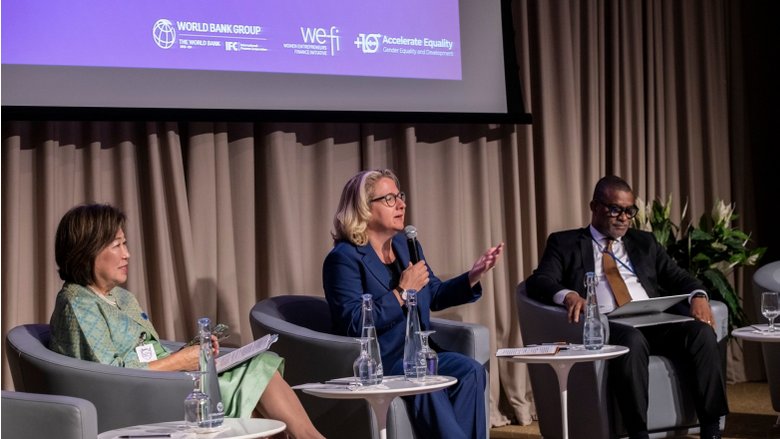October 18, 2022—Placing people at the heart of development has been a major theme throughout the World Bank Group 2022 Annual Meetings. As decades of progress in human capital have been reversed by overlapping global crises, the urgency was palpable at three human development-focused events that shined a spotlight on these critical issues.
Flagship project: Investing in the education of our children and young people
The education and skills crisis exacerbated by COVID-19 was at the forefront of the Annual Meeting’s flagship event: “Investing in the education of our children and young people”, with speakers from government, civil society, the private sector and UNICEF.
“We have an economic and moral imperative to improve education systems around the world. COVID has been a huge blow and what we’re trying to do is figure out the funding principles to get people back to school and create foundational learning experiences that can move kids toward the future,” declared World Bank President David Malpass, who moderated a press conference. panel on recovering learning losses caused by COVID-19. Simulations suggest that post-COVID-19, the learning poverty rate could now reach 70% in low- and middle-income countries.
Learn more: What to do about the high cost of COVID-19 for children, youth and future productivity?
Learning in times of crisis: prioritizing education and effective policies to recover lost learning.
“The key to transforming education lies in political commitment,” said Catherine Russell, Executive Director of UNICEF. “Leaders need to make this a priority. Otherwise, this learning crisis could become a catastrophe. »
Samuel D. Tweah Jr., Minister of Finance and Development Planning of Liberia, spoke about the challenge of investing in education amid other pressing development challenges. He added that not doing so would have a cost.
“Human capital is a major challenge. It’s not just an educational challenge, it’s an economic challenge. Because if we don’t invest adequately, we jeopardize the future,” Tweah said.
The losses are not limited to primary and secondary education.
In a second panel moderated by Mari Pangestu, panelists discussed the challenges of youth unemployment and the disruption of vocational training during COVID. They also explored the opportunities presented by digital transformation, innovative partnerships and investment in skills development.
Augustine Mayabi described how the successful youth employment opportunities program he runs for the Kenyan government targets vulnerable youth: “That this group, even if they have no formal or informal education , can also learn skills and be employable – that’s lesson number one. We do not have to condemn them.
Panelists also highlighted the need to adapt training and education opportunities to the labor market, as well as the importance of targeting vulnerable youth and young women for more inclusive development.

Conclave on human capital and protection of human capital in the context of a global food crisis
Finance, Budget and Planning Ministers from more than 40 countries discussed urgent policy priorities amid the current food crisis at the 2022 Human Capital Ministerial Conclave, the first in-person Conclave in three years. Organized by the World Bank, the conclave is a closed-door gathering of Human Capital Project Networka platform for countries to share their innovations and learn from their experiences.
Ministers focused on the adverse effects of the food crisis on the poor and the consequences for human capital. They highlighted the importance of social protection and investment in sustainable food and nutrition security, not only to avoid human capital setbacks, but also to strengthen these essential outcomes for long-term growth and productivity.
Following the conclave, a public round table explored the same themes further.
KEY POINTS TO REMEMBER:
|
Mari Pangestu, World Bank Managing Director for Development Policy and Partnerships, and Mamta Murthi, Vice President for Human Development, were joined for the discussion by Oulimata Sarr, Minister of Economy, Planning and of Senegal Cooperation and Josh Tetrick, co-founder and CEO. , Eat Just, Inc. The panel shared solutions to address the food and nutrition crisis following the pandemic, the war in Ukraine, and the challenges of climate change.
Minister Sarr highlighted her country’s commitment to social protection, including cash transfers and health coverage. She said investment was crucial to finding solutions. She explained how Senegal’s national school feeding initiative involves local farmers and uses indigenous plants to provide nutrition to children.
“We must be realistic and innovative given the resource constraints countries face in the face of multiple crises,” Pangestu said. She emphasized partnerships along the food system value chain to find solutions and also highlighted the benefits of being both pragmatic and innovative when it comes to providing social protection in the event of a crisis. “The World Bank stands ready to support countries with financing, data and knowledge,” she said.
Tetrick said the planet does not have a stable and secure food supply. His company, Eat Just, Inc., aims to change that by using technology to create products, including cell-based meat, that can feed people at scale.
“We feed more soy and corn to the animals we eat than to the people who go to bed hungry tonight,” Tetrick said, calling for a “transformational overhaul” of the global food system. “We need a food system that works for the planet and for us. »
“COVID-19 has had a very uneven impact,” Murthi said in his closing remarks. “It’s poor children, it’s poor families who haven’t had access to health care, it’s people who have difficulty re-entering the job market. There is a huge demand for more equality that has arisen from COVID, and as the World Bank, this is something we must take into account.
Empowering women to unleash development
Accelerating development and improving human capital outcomes through women’s empowerment was the theme of the paper “Empowering Women to Unleash Green, Resilient and Inclusive Development: Should Development Policy Be Feminist? », event co-organized by the Gender Group of the World Bank and the Women Entrepreneurs Financing Initiative (We-Fi).
The event featured female entrepreneurs who have benefited from We-Fi’s support. Saira Siddique, founder and CEO of medIQ, a Pakistani smart healthcare startup, and Yetunde Adeyemi, founder of Active Foods, a commercial bakery in Nigeria, shared their personal stories about starting and growing businesses amid of overlapping challenges, ranging from the Covid pandemic to increased supply. chain costs. Both speakers highlighted the transformative role that women entrepreneurs can play when they benefit from funding, training and mentorship.
“When you empower one woman, you empower an entire nation,” Adeyemi said.
Two round tables followed on feminist development policies and rethinking the role of gender in development financing.
“A feminist development policy raises the bar beyond gender equality,” Pangestu said. Feminist politics involves embracing equality and empowerment for all, she continued and said that “it calls on us to be accountable for progress in leveraging evidence and best practices and to work in partnership between sectors.
Ernesto Max Elias Tonela, Minister of Economy and Finance of Mozambique, outlined his country’s progressive agenda for women’s empowerment policies, saying it was the right thing to do and important for economic growth.
“If we have to ask ourselves whether development policy should be feminist,” said Svenja Schulze, Germany’s Federal Minister for Economic Cooperation and Development, “we still have a long way to go.” Women’s empowerment must be a guiding principle of development and policy, she said, because women can be agents of change.
Other panelists from the finance, government and CSO sectors agreed throughout their discussions that while the benefits of women’s empowerment are clear, there is still much work to be done. They agreed that an important first step is to gather, analyze and leverage sex-disaggregated data to design policies that support women.
Mamta Murthi closed the event on the same note, recognizing the importance of changing policy frameworks and structural issues, while also emphasizing the importance of data and partnerships.
“We need to change mindsets and norms and that comes from every action we can engage in. We need a massive partnership and we can all play a role. I encourage you to be part of these partnerships, as we are at a crucial moment for gender equality,” Murthi said.


